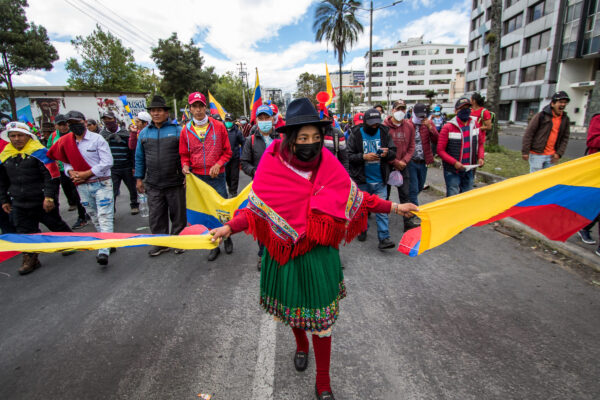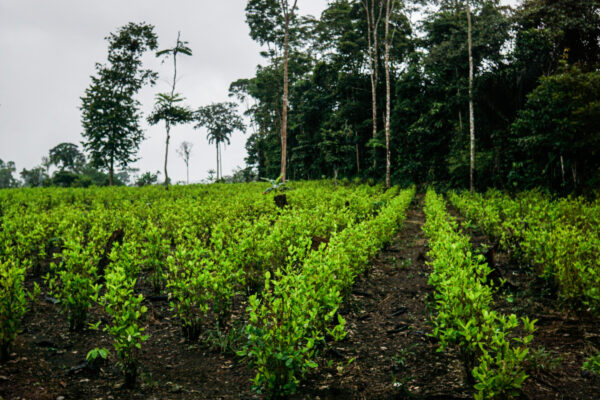Quito – Environmental activists are camping out in treetops and chaining themselves to trees in Ecuador’s Amazon jungle as part of an international campaign to block the construction of an oil pipeline that is to run through fragile tropical forest and highland ecosystems.
In Germany, meanwhile, the Green Party and the environmental watchdog Greenpeace International are holding demonstrations outside the prominent bank that is leading the financing for the project.
For months, local officials in two Ecuadorean provinces along with grassroots organisations of small farmers and indigenous people have been staging roadblocks and have taken over oil wells to protest the pipeline, which has also been questioned by the World Bank and Germany’s Environment Minister Bärbel Höhn.
Greenpeace activists protested Monday and Tuesday outside the Düsseldorf headquarters of the government of the state of North Rhine-Westphalia (NWR) in the western part of Germany, with a representation of the pipeline made out of tires.
The demonstrators demanded that the NWR state government block financing for the Oleoducto de Crudo Pesado (OCP, or Heavy-Crude Pipeline) by the Westdeutsche Landesbank (WestLB), 43 percent of whose shares are owned by NWR. WestLB is heading a consortium of banks providing 900 million dollars in loans to the project.
The government of President Gustavo Noboa defends the 1.1- billion-dollar pipeline as vital to jump-starting Ecuador’s troubled economy. Oil production, which has lagged in recent years, is supposed to double once the new pipeline begins carrying crude to ports on the Pacific coast.
Land has already begun to be cleared for the pipeline in fragile ecosystems, and environmentalists complain that the country’s burgeoning eco-tourism industry will be hurt.
Greenpeace activist Martin Kaiser said the project has failed to take into account the risks involved in running a pipeline through an area of seismic activity and landslides, which could lead to oil spills that would cause serious damages to the Amazon jungle and to the drinking water sources that supply Quito.
Members of the local environmental group Acción Ecológica and Greenpeace activists have toured the pipeline’s 600-km route, which runs from the Amazon jungle across the Andes mountains to a Pacific ocean port in the northwestern province of Esmeraldas, to verify the conditions under which the construction is taking place.
On Guarumos hill, located in the Mindo-Nambillo Cloudforest Reserve, 50 kms northwest of the capital, Greenpeace activists visited the platform camps set up in the treetops by members of Acción Ecológica, who are staging what is reportedly South America’s first “tree-sits”, a protest method that has become common in the United States, to block the pipeline.
The activists will remain chained to the trees until they are physically removed, said Acción Ecológica leader Ricardo Buitrón, who has spent the past two weeks in the area.
“This is a passive resistance measure against a project that will cause the death of the forest, of biodiversity, and, in consequence, of the people living in the areas” the pipeline will pass through, said Buitrón.
Peer Steinbruck, the finance minister of NWR and a member of the WestLB administrative board, “can and should suspend loan disbursements for this project, which is highly destructive of Ecuador’s jungle,” argued Kaiser.
In Germany, the international campaign against the pipeline has won the support of the Green Party parliamentarians and Environment Minister Höhn, who also belongs to that party.
Local authorities in the northeastern Ecuadorean provinces of Sucumbíos and Orellana, along with peasant and indigenous organisations, declared an indefinite strike Monday, which includes roadblocks and the occupation of oil wells, to demand compensation for the environmental damages that will be caused by the pipeline.
Major international environmental groups like Friends of the Earth and Amazon Watch have demonstrated in detail that the pipeline project violates the World Bank’s environmental policies and guidelines.
And on Dec 19, the World Bank addressed a letter to Hernán Lara, the president of the consortium building the pipeline, and sent copies to the NWR government as well as the New York representative of WestLB, demanding greater environmental protections.
The World Bank warned that in case of flaws in the construction and operation of the pipeline, a large part of the Chocó Andino rainforest would run the risk of direct loss of unique habitat and the resultant degradation of natural habitat through deforestation, clear-cutting and illegal hunting, as well as severe oil spills.
Environmentalists warn that the opening up of roads in pristine ecosystems will pave the way for poachers to move in, as well as settlers, who will bring their slash-and-burn techniques to clear farmland.
However, OCP Ecuador SA, the international consortium building the pipeline, insists that the project complies with World Bank rules.
In a Nov 20 press release, WestLB stated that “an indispensable requirement for any financial involvement of WestLB is full compliance with the strict and globally recognised environmental standards of the World Bank by the project sponsors.”
Greenpeace forests expert Michaela Braun, a German national, said she had not imagined that the project was so fraught with flaws, nor that it was so totally lacking in any environmental protective provisions or measures.
“It is chilling. There are areas where there is risk of seismic activity, like Papallacta (50 kms southeast of Quito), where the machines are operating on steep slopes” with no protection whatsoever, said the activist.
In that same area are located the sources of potable water that supply the city of Quito, which could be affected in the case of spills.
In Düsseldorf, Kaiser said the possibly “catastrophic” effects of the project on local communities, indigenous lands and sensitive ecosystems could not be ignored by the governments of Germany and NWR, both of which are made up of a coalition of the Social Democratic and the Green parties.
“It is simply not acceptable for one of Ecuador’s last remaining oldgrowth forests to run the risk of sinking into lakes of petroleum due to the intransigence of the NWR finance minister. That position is a conscious attack on the public interest,” argued Kaiser.
For her part, Braun pointed out that “we have spoken with subsistence farmers in the Amazon jungle, where drilling for oil has destroyed two million hectares of forest in the past 30 years. The construction of the heavy-crude pipeline will destroy another one million hectares.”
The Greenpeace activist said she was shocked that a publicly- funded German bank would finance a project that would not be authorised in Germany. She also reported that a campaign was underway to urge WestLB clients to close their accounts.
“The German people do not want their money to be used for a project that threatens the Amazon and an area as rich in biodiversity as the Mindo-Nambillo cloudforest,” said Braun.
The Mindo-Nambillo forest is part of a unique lowland rainforest area known as the Chocó Andino, which stretches to Colombia and is one of the areas with the greatest variety of bird species in the world.
The campaign staged by Acción Ecológica, Greenpeace, Amazon Watch and more than 30 other Ecuadorean and international non- governmental organisations has been joined by the Italian-based Campaign for the Reform of the World Bank, which will press the Banco Nazionale del Lavoro, which is selling shares in the pipeline, to pull out of the project.
Acción Ecológica activist Ivonne Ramos said the strength of the arguments against the pipeline should force WestLB to suspend disbursements of the 900 million dollar credit granted to the pipeline project.
The Deutsche Bank had refused a request for a loan, due to the environmental damages the pipeline would cause.













